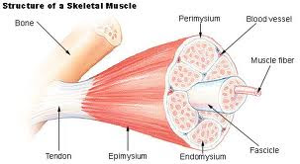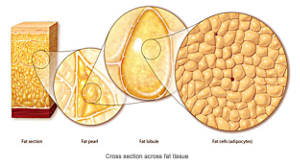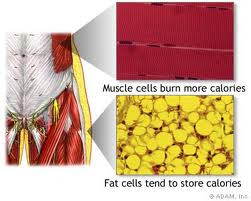Comparing The Same Mass Of Muscle And Fat
A Pound of Muscle Vs. A Pound of Fat: The Truth about Weight Loss
Most people have been around long enough to hear the concept that muscle weighs more than fat. Many people work out frequently as a means to lose weight, and they get frustrated by the fact the scale doesn't go down or the weight doesn't drop fast enough. Sometimes, people work out every single day and find out that they can't lose weight or even gain a little weight, and they don't understand why.
In the gym, you'll hear the phrase muscle weighs more than fat frequently, and many people don't fully grasp the underlying concept that this is trying to get across. The most important difference between muscle and fat as it pertains to weight loss is that muscle fits more mass into a smaller volume than fat. One pound of fat takes up around 18% more volume than a pound of muscle.
Losing Body Fat Doesn't Necessarily Mean Losing Weight.
This is one of the reasons why people that have trouble losing weight while exercising frequently get frustrated, but it doesn't have to be that way. Because exercise builds muscle mass, especially anaerobic exercise, the combination of exercise and healthy eating can lead to a significant loss of body fat without majorly affecting the overall mass of the individual.
After a couple of months of dieting and working out, you may only lose ten pounds or so, but the changes in body composition are much more apparent than the minor loss in weight (not to say that ten pounds aren't an accomplishment in and of itself!
Body Mass Index is the basic rule of thumb when it comes to fitness by age and weight, but many people misunderstand the concept and consider it the be-all-end-all when it comes to gauging health.
Because muscle weighs more than fat, the stronger you are, and the more muscle mass you have, the less accurate your BMI will be at assessing your health based on weight. BMI is very much based on the average specimen, and you want to be more than simply average, don't you?
When you stick to a diet and fitness regimen, its certainly important to pay attention to the number on the scale, but understand that it is only one factor in regard to your physical transformation, and other factors such as muscle mass, muscle tone, and body fat percentage are more revealing.
The following image is a cross-section of your muscle tissue. Notice how densely packed the tissue is? This is why Muscle tissue carries so much mass in so little volume:

Now, look at this cross-section of an adipose fat cell. Fat cells take up a lot more space and are less compact, as you can see:

Fat vs. Muscle: A Visual Representation
The next photo shows five pounds of fat compared directly with five pounds of muscle. It's clear that muscle takes up much less space than fat. Even when counting for the compression underneath the skin, fat is going to take up much more space than muscle. Also, fat contributes to the rounding and lumpiness of men and women with too much body fat because body fat is more amorphous than muscle, which causes the body to take on a more unappealing shape.

It's also important to know that you can't see all body fat. The body also builds fat internally, and your organs are separated by fat tissue. In addition to this, the body isn't designed to carry body fat efficiently.
Our ancestors rarely had the opportunity to build a lot of fat simply due to their hunter-gatherer lifestyle and the fits of feast and famine that they would endure. Body fat was an evolutionary benefit because it could keep people alive longer when times were lean.
Today, however, we in the United States live in a period of veritable, undeniable plenty that our ancestors never had the chance to experience and thus, never adapted to. This is why being overweight or obese is such a health hazard.
On the other hand, as a whole, we have historically been far more fit in the past than we are now. In order to catch our prey and fend off predators and enemies, we naturally stayed strong and fit.
Our early ancestors also tended to be much more nomadic, which means they were used to walking long distances daily. Today, most people can make it through the day with very little physical activity, which causes us to be much weaker and less fit than our ancestors unless we actually take the time to work out, exercise, and build our muscles.
Benefits of Working Out and Building Muscle Mass
Our bodies are designed to function optimally when we build muscle mass and tone. The following are some benefits that both men and women can experience by working out:
Improved Metabolism
A Stronger, Sturdier, Physical Frame, More Resistant to Injury
A More Fit and Attractive Physique
Improved Psychological Health
Enhanced Sense of Well-Being
More Energy
Increased Mobility and Balance
Improves Athletic Performance
Enhanced Healing Due to Improved Metabolic Profile
Healthier Cholesterol and Insulin Levels
And these are just the obvious benefits!
Out of all these benefits, the two that are perhaps most important are your metabolism and your Insulin Sensitivity. Let's talk about those a bit more in-depth.
Enhanced Metabolism
Every pound of body fat you have is equivalent to 3,500 calories of stored energy. Now, there are two ways to get rid of this body fat. You can exercise and burn through those 3,500 calories, or you can eat a more conscientious diet and reduce your calories by 3,500 over a period of time, such as a week. Of course, you can combine these two methods as well.

There are three ways that you get rid of stored fat. For example, the respiration process uses up about 86% of the body fat calories you expend daily. You get rid of around 14% of your fat calories through the acts of urination and sweating.
Increasing your activity level through weight training and resistance training is a highly effective way to increase the rate at which your body burns calories. Although fat carries more volume than muscle, it doesn't burn energy as quickly. This means that pound for pound, the more muscle that you have, the faster your body will burn calories than it will per pound of fat.
How Many Calories Does Muscle Burn vs. Body Fat?
Specifically, a pound of muscle mass will burn around six calories per day, whereas a pound of body fat will only burn around two calories per day.
Of course, it's important to remember that the benefits of building muscle mass are far greater than just your weight and your ability to burn calories. Some health specialists, especially those on television, like to emphasize the ability of muscle mass to incinerate calories, but this is a bit of an overstatement.
In the End, The Calories Your Muscles Burn at Rest Are Only a Piece of the Weight Loss Puzzle
On the other hand, most responsible fitness specialists think that it is important that their clients understand that muscle is better than fat at burning ambient calories, but these benefits have their limits and are often overstated by many times. No one should be building muscle mass just to lose weight because there is a chance you'll be disappointed, especially if you don't combine your anaerobic exercise with cardiovascular exercise and a healthy and nutritious diet.
In fact, if you just engage in anaerobic exercise, this may influence you to eat more and actually gain body fat if you don't make further efforts to lose weight. This is why you see so many weight lifters at the gym that is obviously strong but with a layer of fat over their huge muscles.
In the end, losing weight and being healthy is a concerted effort, and it is true that your ambient metabolism is important, but it's only one part of the process. Many people put too much stock in their muscles' ability to burn body fat, which causes them to be lazy or inefficient in following other aspects of a good and healthy lifestyle. A lot of folks also use their workouts as an excuse to overindulge. The brain plays tricks on the mind in order to fulfill its urges, which can be amplified by your increased metabolism.
Don't Overwork Yourself to Lose Weight.
Of course, it's no good to spend too much time obsessing over your fitness and nutrition regimen as well. Many people, in an effort to get healthy and lose weight, spend hours at the gym each day, exhausting themselves and overworking their bodies. To lose weight, they combine this exercise with severely restrictive diets that deny them the necessary calories and nutrients they need to get through the day.
Ultimately, this approach and those like it are incredibly unhealthy because they damage their bodies through their actions. Even worse, these people often lose their gains in the end when they lapse from their hardcore training and dieting, or they succumb to an injury and give up on their health regimen. They often gain all the weight back and more.
The end goal of a healthy fitness regimen is to provide the body with anaerobic and aerobic stimulation without going overboard and combining that exercise with a thoughtful and healthy diet. It's all about being smart about how you do things.
When it comes to health, strong basal metabolism is an important aspect, but controlling insulin and glucose levels is even more important for maintaining health, and it doesn't involve hours upon hours slaving away in the gym, but a conscientious exercise and diet regimen that promotes optimal cardiovascular health and hormone balance.
Maintaining healthy muscle mass and combining it with a good diet keeps hormone levels optimally balanced, creating homeostasis in which Human Growth Hormone, Testosterone (for both sexes), and Insulin Levels remain in an optimal range. When Glucose Sensitivity gets out of whack, this rewires the body, causing it to build body fat more quickly and inhibit weight loss as well as the ability to maintain healthy body composition.
How Does Exercise Regulate Glucose Metabolism, Improving Body Composition and Health?
In an article published in the Journal of Clinical Endocrinology and Metabolism in 2011, researchers presented data showing that insulin sensitivity largely correlates with a patient's muscle mass. In fact, a ten percent increase in lean muscle mass led to an average eleven percent reduction in insulin resistance.
More Muscle Mass = Less Risk of Diabetes
This is the main reason that people with more muscle mass have a lower incidence of diabetes. When individuals have optimal insulin sensitivity, this means that the body responds swiftly to the influence of glucose in the body. Patients with poor glucose sensitivity are more prone to directly convert glucose in the bloodstream into fat rather than converting it into immediately usable energy.
If the body is creating energy directly from blood sugar, this helps the body burn fat more effectively and improves overall hormone balance. By taking responsible steps in one's diet and lifestyle, it is possible to rewire the body by encouraging enhanced insulin sensitivity, keeping the body lean, strong, and full of energy.
Of course, this reiterates the fact that the scale doesn't really matter. Improving body composition is a process, and improving hormone balance takes time. By taking fitness and nutrition seriously and responsibly, you put your faith in the science behind your body, and it benefits you most to not think of numbers on the scale as goals, and you really don't have to think about them at all.
Don't Get Hypnotized by the Scale.
People who focus too much on the scale get frustrated because they often don't feel that the effort they've put in at the gym and dinner table is leading to the appropriate results. Becoming hypnotized by the scale blinds them to the physical changes occurring within the body and numbs them to the psychological and metabolic benefits that they are likely experiencing. This is one of the primary reasons people lapse from their regimen, but it doesn't have to be that way!
Anyone who has ever tried to try to lose weight likely understands this plight or even knows what it feels like to just give in and give up. It's easy to think of exercise and eating healthy as a simple give and take, where the effort you put in directly correlates with weight loss, but this is simply not the case. Every time you step on the scale, you're excited to see how much weight you've lost, but all too frequently, you've lost no weight or even gained a bit, and with all that effort!
There's nothing wrong with using the scale as a source of motivation, but don't let yourself get caught up in numbers and strict goals. Allow your fitness regimen to be a process, and give in to that process. If you feel that the scale is a source of frustration for you, put the scale away for a week or even two weeks, and just keep following your game plan.
Come back a week or two later, look at yourself in the mirror and see if you notice any change. Take your physique, recognize the benefits, and then step on the scale. Taking time off from the scale makes it more likely that you will see a noticeable change in your weight, a change in your shape, or both!
Dieting is a Lifestyle
That number on the scale represents only a microcosm of all of the changes that are going on in your body. The scale won't tell you you have more energy. The number on the scale won't make you feel better.
The number on the scale doesn't even accurately represent your body composition! Understand that all that work that you are putting in at the gym is not all for naught; if you are sticking with a good exercise and diet regimen, your body is truly going through a metamorphosis, even if the number on the scale remains the same for days or even weeks at a time! You are more than a number!
The difference in volume between a pound of fat and a pound of muscle is positively huge, and in terms of your physique, it is more important than the amount of energy each pound of muscle that you burn. In addition, your muscles help constrain and control the way that fat distributes across your body, making the body fat you still have less noticeable!
Understanding the science behind weight loss, muscle mass, and metabolism makes it easier to withstand the effort involved in a successful exercise and nutrition regimen. In regard to physical fitness, knowledge truly is power.
Don't give in to the mental shortcuts like the scale that can discourage you and prevent you from reaching your goals. Just follow your plan, focus on gradual change, and appreciate the subtle positive changes in your physical and psychological health, and in a matter of months, you'll both look and feel like a new man (or woman)!
- Xylitol is a Natural, Plant-Sourced and Low-Calorie Sweetener [Last Updated On: January 8th, 2025] [Originally Added On: January 12th, 2021]
- The Secret Behind Keeping the Weight Off for Good -- No More Losing and Gaining Cycles! [Last Updated On: January 17th, 2025] [Originally Added On: January 13th, 2021]
- The Cognitive Benefits of Starting a CoQ10 (Coenzyme Q10) Supplement Regimen [Last Updated On: January 12th, 2025] [Originally Added On: January 14th, 2021]
- It's Time to Understand Why Vitamin C is Critical for Our Health and Longevity! [Last Updated On: January 10th, 2025] [Originally Added On: January 15th, 2021]
- Snoring is the Most Common Early Symptom of Sleep Apnea -- Do You Suffer From It? [Last Updated On: January 11th, 2025] [Originally Added On: January 16th, 2021]
- Vitamin-d Longevity Vitamin [Last Updated On: January 2nd, 2025] [Originally Added On: January 17th, 2021]
- Twenty Simple Weight Loss Tips That Can Change Your Life [Last Updated On: January 1st, 2025] [Originally Added On: January 18th, 2021]
- Twelve Ways To Control Cravings [Last Updated On: February 22nd, 2025] [Originally Added On: January 19th, 2021]
- The Truth About The Zone Diet [Last Updated On: January 1st, 2025] [Originally Added On: January 20th, 2021]
- The Truth About The Schwarzbein Principle [Last Updated On: December 31st, 2024] [Originally Added On: January 21st, 2021]
- The Truth About The Realage Diet [Last Updated On: December 31st, 2024] [Originally Added On: January 22nd, 2021]
- The Truth About The Origin Diet [Last Updated On: December 30th, 2024] [Originally Added On: January 23rd, 2021]
- The Truth About The Eat Right, Live Longer Diet -- Nourishing Food Equals Increased Longevity [Last Updated On: January 31st, 2025] [Originally Added On: January 24th, 2021]
- The Essential Roles Magnesium Plays For Our Energy Levels, Skin Youthfulness and Mental Health [Last Updated On: January 4th, 2025] [Originally Added On: January 25th, 2021]
- The Real Skinny On Vitamin B12. What It Can And Cannot Do For You [Last Updated On: March 23rd, 2025] [Originally Added On: January 26th, 2021]
- The Importance And Purpose Of Stress [Last Updated On: February 18th, 2025] [Originally Added On: January 27th, 2021]
- The Ideal Balanced Diet The Reality Of Healthy Eating [Last Updated On: December 30th, 2024] [Originally Added On: January 28th, 2021]
- The Effects Of Cortisol On The Body [Last Updated On: July 28th, 2024] [Originally Added On: January 29th, 2021]
- Sixteen Common Foods That Increase The Cancer Risk [Last Updated On: December 29th, 2024] [Originally Added On: January 30th, 2021]
- Should You Consider Intermittent Fasting? [Last Updated On: November 24th, 2024] [Originally Added On: January 31st, 2021]
- Can Caloric Restriction Help You Lose Weight And Live Longer? [Last Updated On: November 24th, 2024] [Originally Added On: February 1st, 2021]
- How Does Poor Sleep Rob Vitality And Health? [Last Updated On: November 24th, 2024] [Originally Added On: February 2nd, 2021]
- Nine More Natural Ways To Relieve Anxiety [Last Updated On: November 24th, 2024] [Originally Added On: February 3rd, 2021]
- Metabolism Boosting Tips For Losing Weight And Feeling Great [Last Updated On: November 22nd, 2024] [Originally Added On: February 4th, 2021]
- Juicing Pros And Cons [Last Updated On: March 22nd, 2025] [Originally Added On: February 5th, 2021]
- Insomnia Guide [Last Updated On: November 21st, 2024] [Originally Added On: February 6th, 2021]
- How To Lose Weight With Human Growth Hormone [Last Updated On: November 20th, 2024] [Originally Added On: February 7th, 2021]
- How Safe Is Monosodium Glutamate AKA Msg? [Last Updated On: November 23rd, 2024] [Originally Added On: February 8th, 2021]
- How Is Sleep Apnea Diagnosed And Treated [Last Updated On: November 18th, 2024] [Originally Added On: February 9th, 2021]
- Hidden Sources Of Sugar In Common Foods [Last Updated On: November 17th, 2024] [Originally Added On: February 10th, 2021]
- How Would You Like to Potentially Add 14 Healthy and Youthful Years to Your Life Span? [Last Updated On: November 19th, 2024] [Originally Added On: February 11th, 2021]
- Four Reasons Why Healthy Sleep Encourages Weight Loss [Last Updated On: November 16th, 2024] [Originally Added On: February 12th, 2021]
- Omega-3 Fatty Acid Facts And How They Relate To Hormone Replacement Therapy [Last Updated On: July 25th, 2024] [Originally Added On: February 14th, 2021]
- Drink Right To Live Well [Last Updated On: November 15th, 2024] [Originally Added On: February 15th, 2021]
- Consumers Of Processed Meat Put Themselves At Risk [Last Updated On: November 14th, 2024] [Originally Added On: February 16th, 2021]
- Watermelon Health Food? The Benefits Of L-citrulline And Watermelon [Last Updated On: November 13th, 2024] [Originally Added On: February 18th, 2021]
- Alcohol Appears To Impact Sperm Quality [Last Updated On: November 12th, 2024] [Originally Added On: February 19th, 2021]
- The Benefits of Selenium - Should You Take a Selenium Supplement? [Last Updated On: February 9th, 2025] [Originally Added On: April 8th, 2021]
- Selenium and its Impact on Your Health and Hormones [Last Updated On: March 3rd, 2025] [Originally Added On: April 8th, 2021]
- Scientifically Proven Benefits Of Turmeric The Indian Spice [Last Updated On: March 18th, 2025] [Originally Added On: April 27th, 2021]
- Natural Remedies for Heartburn or Acid Reflux [Last Updated On: February 18th, 2025] [Originally Added On: May 22nd, 2021]
- What the Heck Is a Raisin, Anyway and Why Would I Want to Eat One? [Last Updated On: August 18th, 2024] [Originally Added On: June 10th, 2021]
- Fat-Focused Diet May Help Boost Testosterone [Last Updated On: February 17th, 2025] [Originally Added On: June 10th, 2021]
- Chia Seeds: More Than Just a Fad [Last Updated On: July 12th, 2024] [Originally Added On: June 24th, 2021]
- Intermittent Fasting Boosts Growth Hormone, and Improves Cognitive Health [Last Updated On: March 4th, 2025] [Originally Added On: May 2nd, 2022]
- Growth Hormone, Nutrition, and Diet Affect Longevity [Last Updated On: February 14th, 2025] [Originally Added On: May 6th, 2022]
- How Your Health is Affected by Brown and White Fat [Last Updated On: February 14th, 2025] [Originally Added On: May 17th, 2022]
- Tesamorelin Boosts HGH Levels and Burns Belly Fat [Last Updated On: February 14th, 2025] [Originally Added On: May 21st, 2022]
- Build Muscle With Tofu - Don't Fear Soy [Last Updated On: December 29th, 2024] [Originally Added On: July 12th, 2022]
- Balancing HGH Levels with Weekly Sogroya [Last Updated On: December 28th, 2024] [Originally Added On: September 1st, 2022]
- Pecans Are Amazing [Last Updated On: February 19th, 2025] [Originally Added On: November 22nd, 2022]
- The Benefits of Fenugreek [Last Updated On: October 14th, 2024] [Originally Added On: November 24th, 2022]
- The Foods To Eat To Increase Stem Cells [Last Updated On: March 6th, 2025] [Originally Added On: December 7th, 2022]
- The Versatility of Pecans [Last Updated On: February 19th, 2025] [Originally Added On: February 9th, 2025]
- Understanding The Concept: A Pound Of Muscle Vs. A Pound Of Fat [Last Updated On: February 19th, 2025] [Originally Added On: February 11th, 2025]
- The Aging Enigma: Unravelling the Web of Human Growth Hormone Decline [Last Updated On: February 17th, 2025] [Originally Added On: February 12th, 2025]
- Rekindling the Flame: How a Fat-Friendly Diet Can Ignite Testosterone Levels [Last Updated On: February 14th, 2025] [Originally Added On: February 13th, 2025]
- Unlocking Your Inner Fountain of Youth: The Magic Elixir of HGH Injections for Women [Last Updated On: February 17th, 2025] [Originally Added On: February 14th, 2025]
- Effective Strategies for Controlling Cravings [Last Updated On: February 17th, 2025] [Originally Added On: February 17th, 2025]
- Overview of Hormone Replacement Therapy and the Role of Intermittent Fasting [Last Updated On: February 22nd, 2025] [Originally Added On: February 22nd, 2025]
- Understanding the Power of Stem Cells [Last Updated On: February 24th, 2025] [Originally Added On: February 24th, 2025]
- The Role of Selenium in Health and Hormones [Last Updated On: February 26th, 2025] [Originally Added On: February 26th, 2025]
Word Count: 2545







